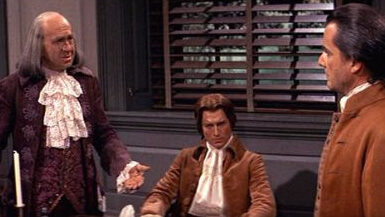I have written many times about my love for “1776,” the musical by Sherman Edwards and Peter Stone about the founding fathers who wrote the Declaration Of Independence.
“1776” is the greatest historical musical Broadway ever produced (yes, including “Hamilton”). It brings to life the patriots of the Continental Congress, who struggled to kick-start this country’s freedom. The movie version should be televised every July 4th to celebrate the birthday of this free nation. It should be mandatory viewing in every school social studies curriculum in this country. Through its stories, songs, and sense of humor, “1776” brings history to life.
Sadly, it’s relevant again in today’s America as we prepare to celebrate July 4th at a time when the democracy birthed 248 years ago may very well be on the cusp of being snuffed.
I was fortunate to see the original production on Broadway, as well as a revival years later, and yet another production on the huge stage of The Muny in St Louis. I have also seen the movie version, directed by Peter Hunt, dozens of times — and any time I come across it on TCM, I can’t help but watch it all the way to the end again.
My wife and I own a DVD of “1776” and have shown it to our daughter many times, beginning when she was in elementary school. From the very first time, she has loved the way the story is told and sings along with all the songs. When we traveled to Philadelphia and went to Independence Hall, she saw the very rooms where the Continental Congress met and remembered everything about them, thanks to the movie.
Twenty years ago, I wrote an op-ed for the St. Louis Post-Dispatch after hearing the school board in Fairfax County, Virginia, had banned the movie from being shown to middle school students. Why? Because of a mild verbal exchange in the screenplay.
John Adams (William Daniels, in a tour de force performance) and others are trying to convince Thomas Jefferson (Ken Howard, also excellent) to write the Declaration. Jefferson rebuffs Adams, explaining he is leaving Philadelphia to return to Virginia, because “I’ve not seen my wife in six months.” Adams replies, “Jefferson, will you be a patriot, or a lover?” Jefferson pauses and announces his choice: he’ll be a lover. Adams — who is obnoxious and disliked — won’t give in. He insists, demands, and cajoles until Jefferson complains that he “burns” for his wife.
It is that word, “burns,” that was apparently too much for the Virginia schools. How ironic that this mild innuendo — and that’s elevating it far beyond its rightful level in the lexicon — would be deemed too much for students in Jefferson’s home colony to hear. That this is happening in the year 2024, when real sexual language is pervasive in music, TV, radio (and certainly in the schoolyard), makes it even more ludicrous.
What were the Virginia school bureaucrats afraid of? That they’d have to explain the meaning of the words in that scene? It’s not like Jefferson says he burns because of his wife (then you’d have to explain STDs to the kids), but rather for his wife, a concept which can be easily explained, without even bringing sex into it. Tell any inquisitive kid that it is Jefferson’s love for his wife that burns inside him. That’s simple. So simple, in fact, that if you can’t handle this one, you shouldn’t be an educator.
Of course, it’s not the educators who made this decision.
As one teacher protested in an anonymous e-mail to the school board and community leaders: “Teachers are far better able to determine what material is suitable for teenagers than administrators who have not been in the classroom for years or attorneys whose job it is to protect the school system from the complaints and concerns of a few parents who have a political axe to grind. In the last 10 years, [the school system] has increasingly based educational decisions on fear instead of strength.”
Remember, this was two decades ago, long before the current madness of banning books and defunding school libraries. At the time, I recommended that the parents of Fairfax County should rent or buy a copy of “1776” and show it to their kids. Now, in 2024, they can watch it for about four bucks on multiple streaming platforms.
Then everyone can understand how contemptible it is that a great movie about liberty be denied to those who should be learning about freedom — and benefit from it. After all, we may need those modern-day students to stage a revolution of their own in a few years to rebuild our democracy by standing up to the greedy fascist felon who has been granted the powers of a monarch by a corrupt Supreme Court.

